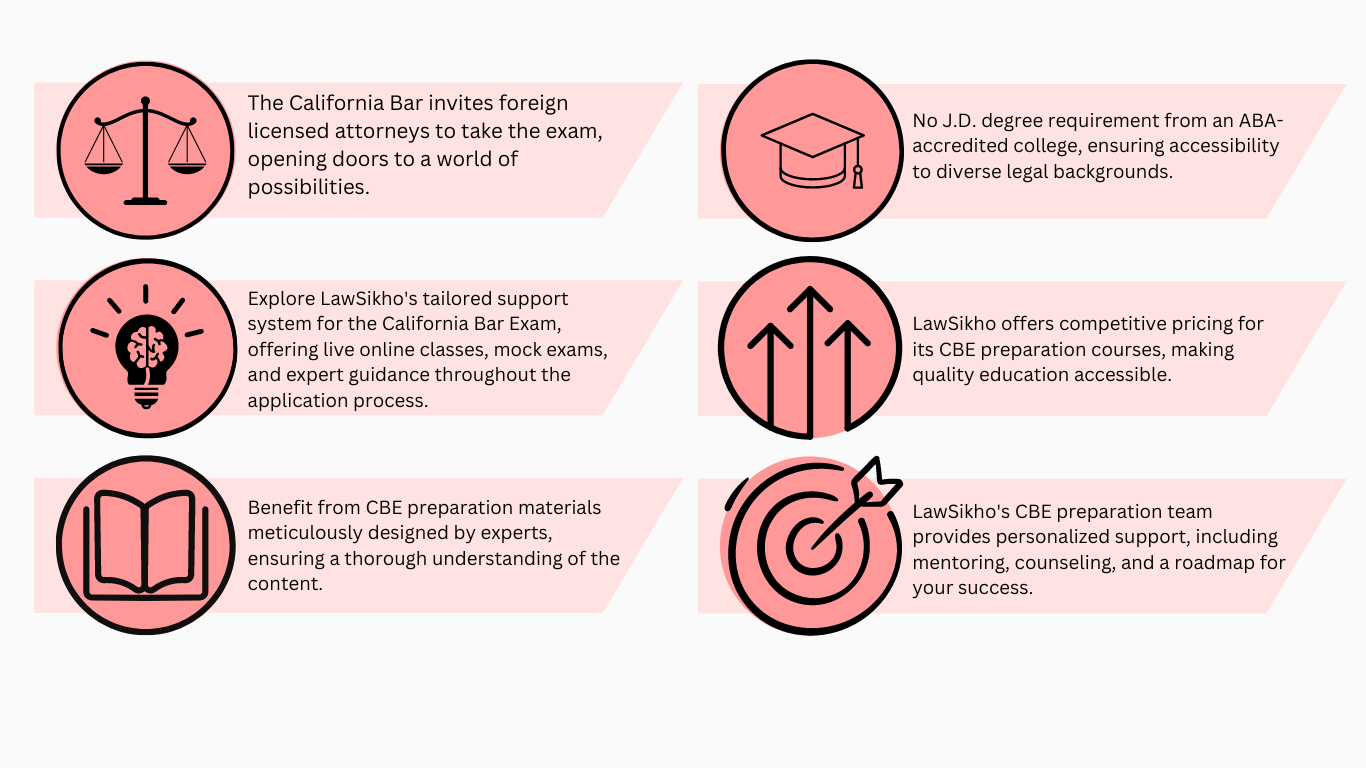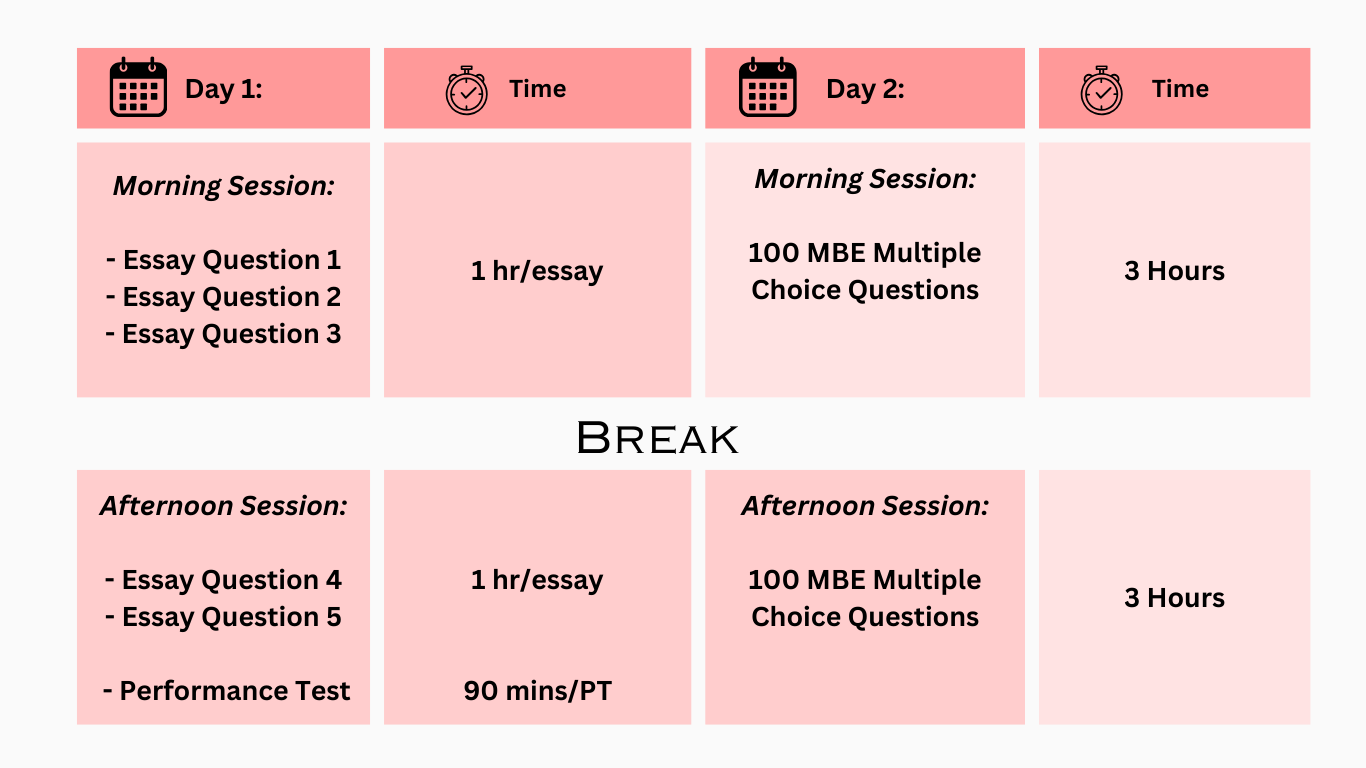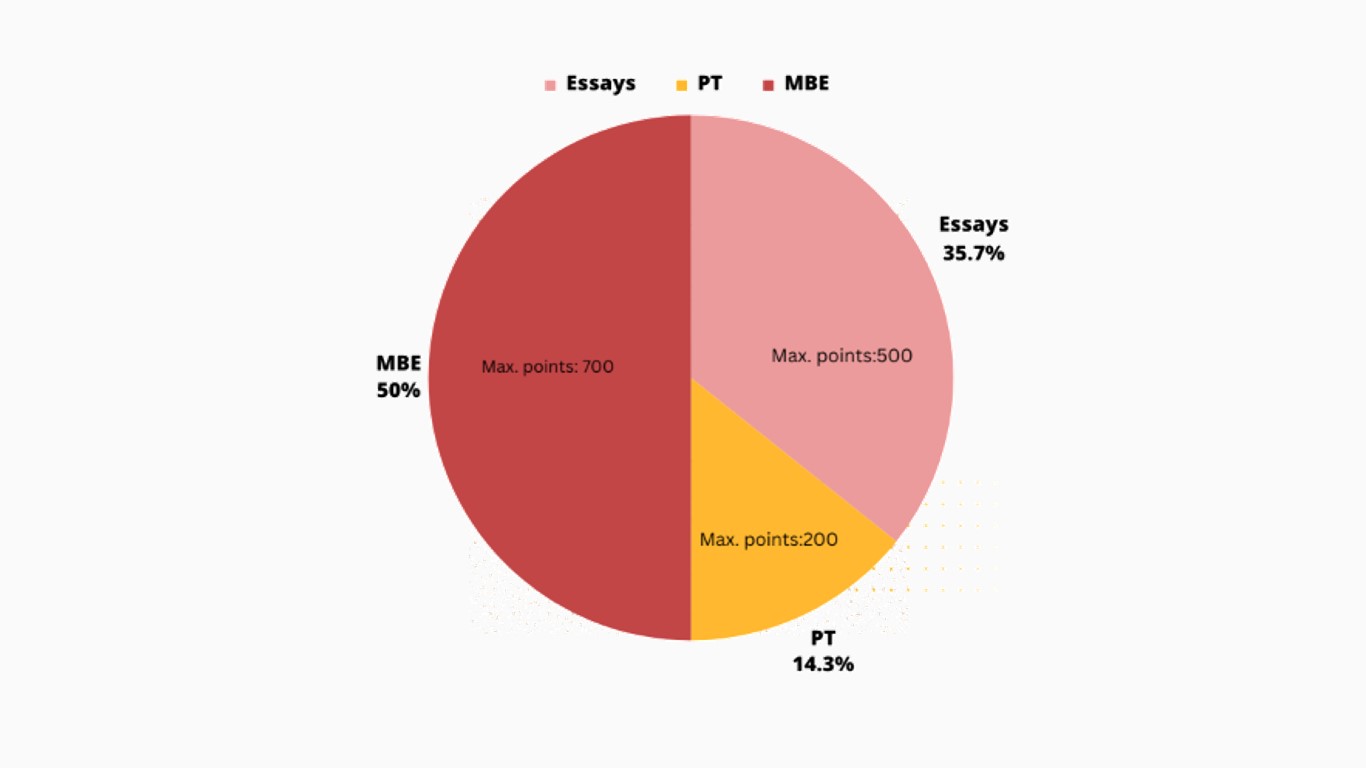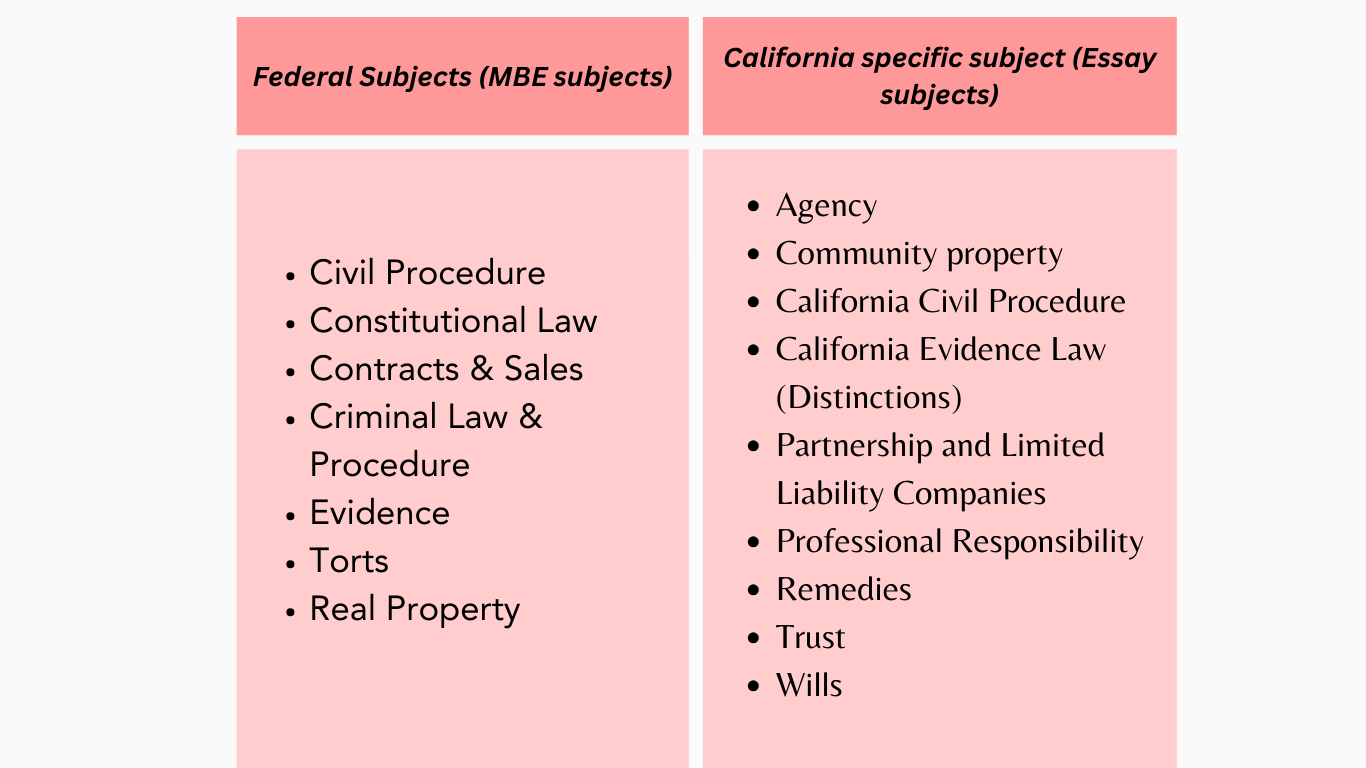Introduction

Ever found yourself dreaming big with that quintessential American Dream, only to hit a roadblock because of the hefty price tag attached to an American degree?
We’ve got you covered!
You can now do so by attempting the California Bar Exam.
Wondering how is this possible and how will you ever navigate all through this???
Stick with us to find out how!!
Whether you're an experienced attorney or just starting your legal journey, our course is designed for everyone. We cater to your unique background, ensuring a seamless transition into U.S. legal practice.
As India’s only course dedicated to the California Bar Exam, we bring a touch of home to your preparation. Benefit from our expertise in navigating the nuances of the exam.
The best part? Say goodbye to the overwhelm of figuring it all out on your own. Our course is approachable, with clear guidance and support every step of the way.
You focus on studying, and we take care of all the planning for you. From study schedules to exam prep material to finding you the right visa consultancy, we’ve got the details covered so you can concentrate on mastering the Test prep.
Who can take the exam?
If you are a law graduate registered to practice in your country and have a good standing with your Bar Association, you are eligible for the California Bar Exam. California's open policy warmly welcomes foreign law graduates and lawyers, without imposing restrictions based on nationality or residence.
Why Should You Take the Exam?
The California Bar Exam is designed for individuals with legal analytical skills and a practical legal approach. You don't need a J.D. from the United States; the exam focuses on testing the practical approaches of a lawyer rather than rote memorization of case laws or legal provisions.
Who Else Should Consider the Exam?
- Lawyers planning to migrate to the USA.
- Law graduates aspiring to pursue an LLM in the USA.
- Lawyers whose law firms or companies are sponsoring their work visa in the USA.
California Bar Exam Pattern
The exam is given twice every year: the February exam and the July Exam.
Here is a simplified breakdown of the California Bar Exam format:
Written Portion:
- Three Essay Questions (Morning session)
- Two Essay Questions and One Performance Test (Afternoon session)
The essay questions require test takers to analyze legal issues and provide well-reasoned written responses. The Performance Test evaluates practical lawyering skills by presenting a simulated legal task that requires organization, analysis, and writing.
Multistate Bar Examination (MBE):
- 200 Multiple Choice Questions
- Split into two three-hour sessions (100 questions per session)
- Covers various areas of national law, including criminal law, torts, civil procedure, constitutional law, contracts, and more.
The MBE tests the examinee's understanding of fundamental legal principles and their ability to apply them to hypothetical scenarios.
The California Bar Exam spans two days, with the first day focusing on the written portion (essays and performance tests) and the second day dedicated to the MBE.

Minimum passing marks:
It is important to note the minimum passing score is required to pass the exam.
The California bar exam has 2000 possible points. You need 1390 or above points to pass the California bar exam.
However, If you score between 1340 and 1390, you get a second reading and may get a second chance.
Points divided based on Essays, MBE, and PT:

The written portion (essays & PT) and MBEs are equally divided at 50% each and it is important to attempt both with the same level of dedication.
Testing subjects:

Application fees:
The application fees for foreign attorney applicants (updated as of 2024): $1,500 + Taxes These fee amounts do not include the laptop fee or any late fees.
To start the application process click here.
What are Laptop registration fees?
Laptop registration fees (recently updated 2024): $153 (+$50 for late registration)
The California Bar Exam can be taken as a written exam or on a laptop. The applicant needs to register for the Laptop Examination software before the due dates on the CalBar site.
The applicant will take their own laptops that must meet the CalBar laptop registration requirements.
To know more about the requirements and process please click here.
Career after clearing the Bar Exam:
If you are a foreign applicant attorney recently qualified for the bar you can work in different roles in the private sector:
- Launching Your Solo Legal Venture: Establish your practice post-licensure, offering independence and flexibility.
- Specializing in Big Law Practice Areas: Secure coveted roles with top-tier salaries, specializing in specific practice areas.
- Medium-Sized Firm Experiences: Gain diverse insights into law with balanced workloads and a manageable pace.
- Thriving in Small Firms: Join a close-knit team focusing on specialization or general practice for rapid skill development.
- Thriving in Boutique Legal Practices: Explore niche areas like intellectual property, tax, or campaign finance, collaborating on unique transactions.
- Arbitration and Mediation: After clearing the bar, practice as an arbitrator or mediator in most states if not all.
Key Considerations Before Taking The Exam:
- Ensuring you meet all requirements/eligibility for the exam before diving into preparation.
- Creating a smart study schedule that balances practice and focused exam prep.
- Understanding how to apply legal principles across jurisdictions to broaden your perspective.
- Seeking practical wisdom to navigate legal scenarios effectively.
- Analyzing past papers for trends and patterns to tailor your study approach.
- Practicing clear and concise writing to effectively convey legal concepts in your answers.
- Learning effective time management skills in answering the questions.
How will we help you?
- Navigate the application process effortlessly with our step-by-step assistance.
- Connect confidently with experienced Visa Consultants for a smooth journey.
- Plan effectively with insights from trend analyses on past and new questions.
- Focus your study with strategic sessions on Essays, MBE, and PT.
- Craft articulate and concise responses with sharpened writing skills.
- Elevate your application of legal principles for exam success.
- Deepen your context understanding through immersive U.S. case studies.
- Stay informed on the latest U.S. regulations and developments.
- Optimize performance with essential time management skills.
- Augment preparation with U.S. practice and freelance assistance
What is Unique about this course?
|
Service
|
Ours
|
Others
|
|
Live Classes
|
144 live classes (1.5 to 2 hours) + Mentoring/Doubt Clearing Sessions
|
No or few live classes
|
|
Duration
|
18 months (15 months regular classes + 3 months prep classes)
|
Usually 6 months crash course
|
|
Cost
|
₹2,90,000
|
Typically more than ₹5,00,000
|
|
Assignment Assistance
|
50+ assignments, including a variety, not just past year questions
|
Often limited to past year questions only
|
|
Evaluations
|
Detailed feedback based on CBE grading system
|
Paid evaluations on $90 or more
|
|
Faculty
|
Qualified and licensed to practice in California
|
Trained professionals without specific licensing
|
|
Application & Registration Guidance
|
Step-by-step guidance through the application process
|
No procedural help
|
|
Newsletter/Updates
|
Regular updates on CalBar process and relevant information
|
No updates
|
|
Prep Sessions
|
3 months prep course before exams for additional support
|
No Prep phase
|
|
Money Back Guarantee
|
45-day money-back guarantee with details in the refund policy
|
No Money Back Guarantee
|
Faculty Members
Aarohi Kashyap
LL.M, UC Berkeley- School of Law | Dual Qualified Attorney (India and California)
Raghav Mendiratta
Oversight Board - Meta | Dual Qualified Attorney (California, USA and India) | London School of Economics
Anirudh Ramakrishnan
Dual Qualified Attorney & Advocate (Admitted to Practice Law in California & India); LLM at UC Berkeley, 2023-24
Note:
This is an indicative list of our guest faculty members and not an exhaustive list. We may change the faculty members at any point based on availability.
Course Plan
Above prices are inclusive of all applicable taxes and charges.
Option to convert your payment into 2 instalments is available on checkout page.
 Standard
Standard
RS. 290000
incl. of all charges
View details
Access to course material and live lectures for five years.
Group and personal mentoring sessions for all the core subjects and specialisation.
Get digital access to entire study material
Access on LMS, Android & iOS app
Instructor feedback on assignments
Unlimited doubt clearing sessions
Instructor led course with online live classes
CV enhancement
Coaching for professional networking
Internship & job support
Personalised freelancing support
Interview preparation support
Top performers are recommended for jobs and client opportunities
FAQs
What does Attorney in Good Standing mean?
"Attorney in Good Standing" means a lawyer who is currently authorized to practice law, has a valid license, and is not facing disciplinary actions. It indicates compliance with ethical standards and requirements set by the legal jurisdiction. You can apply to get the good standing certificate from your Bar Association.
Is it necessary to visit the United States to take the California Bar Exam?
Yes, since the California Bar Exam is exclusively administered in Southern and Northern California, candidates are required to visit the official website to find a suitable testing location. There are no testing locations for the exam outside these regions. It is important to plan accordingly and verify any updates with the California State Bar.
Is the exam open book?
No, the California Bar Exam is not an open-book exam. Participants are not allowed to bring any reference materials or notes into the examination room nor is it provided by them.
Do I need to have in-depth knowledge of US laws before taking up this course?
Our Test Prep course for the California Bar Exam is structured to accommodate students without a prior foundation in U.S. laws. While it can be advantageous to have some basic knowledge, our emphasis is on teaching the application of legal principles and the development of essential legal skills. Our program is designed to provide comprehensive support, allowing students to grasp the necessary concepts and skills required for success in the exam, irrespective of their prior legal background.
If I qualify to practice law in California, will I be required to relinquish my current practicing license?
No, obtaining a California license generally doesn't necessitate giving up your current practicing license in your home country. However, it's essential to thoroughly review the specific regulations of both jurisdictions. Some places allow attorneys to hold licenses in multiple jurisdictions, while others may have certain requirements or restrictions on dual licensure.
Is it beneficial to work as a paralegal with U.S.-based clients before undertaking the California Bar Exam, and how does this contribute to a stronger student profile?
Engaging in work as a paralegal with U.S.-based clients is highly advisable before embarking on the California Bar Exam journey. This experience not only enriches your professional background but also provides hands-on exposure to the intricacies of U.S. legal practices. Working as a paralegal allows you to build practical skills, gain familiarity with relevant procedures, and strengthen your foundational knowledge. Integrating this experience into your profile enhances your readiness for the exam and positions you more favorably as a prospective candidate. Consider this strategic step in your preparation for a successful California Bar Exam experience.




















 ADDICTIVE LEARNING TECHNOLOGY LIMITED
ADDICTIVE LEARNING TECHNOLOGY LIMITED











